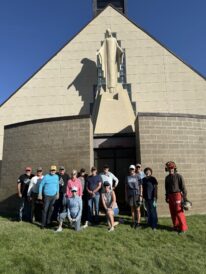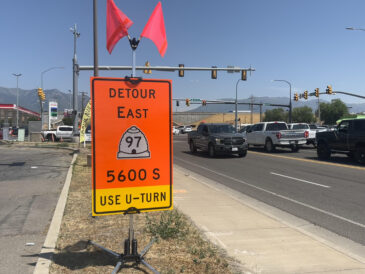Intermountain doctors: Colon cancer screenings sank during pandemic; cases on uptick

Barbara Haddock Taylor, Baltimore Sun
Cynthia Bledsoe looks at a laptop computer that displays an image from her virtual colonoscopy.Colon cancer screenings in Utah are down 50% since the beginning of the pandemic, according to Intermountain Healthcare. Because of this, physicians have seen a 15% rise in colon cancer cases.
During a press conference Wednesday, two Intermountain physicians expressed concern over those numbers and urged Utahns to refrain from delaying such screenings any longer.
“I think it’s just been overwhelming with everything going on with COVID,” said Dr. Nathan Merriman, a gastroenterologist with Intermountain. “There’s been a lot of postponement of screening, but with the drop in COVID patients, it is safe to come back and, in fact, I’m encouraging it, especially with this month being Colon Cancer Awareness Month.”
Merriman said many people were hesitant during the pandemic to go in for regular health screenings. He said some of his patients waited four to nine months with rectal bleeding before seeing their doctor.
“That is way too long to wait,” he said. “Some people are downplaying their symptoms. They’ll have persistent bleeding for months and they’ll just say, ‘Oh it’s probably hemorrhoids.’ And while a lot of people have hemorrhoids, persistent symptoms should always be evaluated.”
Dr. Mark Lewis, an Intermountain oncologist, said colon cancer is a largely preventable disease. By the time a patient gets to his office, the cancer has advanced.
“I am seeing a 15% increase of people at the later stages of colorectal cancer,” Lewis said. “If we can find this at the polyp level, you may never need to see an oncologist like myself — and I know for a fact, you don’t want to meet me in a professional setting.”
Lewis said colon cancer is the third most common cancer overall and is one of the most deadly. However, it’s also one of the most preventable.
“Everybody has a colon but a lot of people don’t like to talk about the issue,” he said. “It’s really important for people to sit down and talk about their family history. I have to tell you how important it is to get through the discomfort and get to the truth. You want to know as much as possible what diseases run in your family including cancers in other organs. If you are a woman and you have a history of endometrial cancer, that matters a lot to us.”
Colon cancer symptoms can include rectal bleeding, narrowing of the stools, weight loss and abdominal pain, Lewis said. It is slightly more common in men and the African American community. There is also a theory that overuse of antibiotics during childhood could be a cause of colon cancer later in life. Risk factors include a family history of colon cancer, ulcerative colitis and inflammatory bowel disease.
“It’s very easy for us to assume benign causes, but I have seen too many cases of bleeding written off as nothing,” Lewis said. “As a society, we’re focused on weight, but I don’t like to see unintentional weight loss with abdominal pain. That’s a big red flag that something is wrong.”
Another reason people might delay getting a colonoscopy is the prep work, Merriman said.
“It’s probably the most challenging part,” Merriman said. “But we are always trying to improve it and I’ve had patients tell me it’s so much better than it used to be. It’s tolerable, not terrible.”
Merriman said he went into gastroenterology because it so largely focuses on preventive care.
“When I was 13 we had a fire in our house and it took the lives of both of my parents. My brother and I made it out. He was 11 and our parents were 38 and 39,” he said. “I’ve done a lot of work understanding how things happen and how we can do better and prevent tragedy. Both of my parents smoked. The fire was caused by an overturned ash tray.”
Merriman said if his parents hadn’t become addicted to smoking, they may be alive today.
“That’s what drives me. We have this amazing ability to prevent suffering by identifying polyps in the colon and removing them and preventing a cascade of cancer,” he said. “We need people to get in for their screenings beginning at age 45 if they are at average risk and if you’re not sure when you need to get in to get screened, ask for help.”



